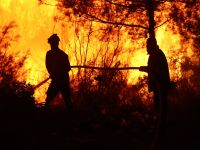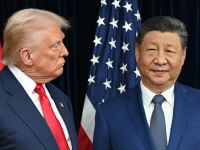Taliban territory in Afghanistan shrank further Thursday as the Islamic militia's fighters withdrew south towards their stronghold Kandahar, where hostile tribes were reportedly causing chaos.
Militia leader Mullah Mohammad Omar ordered a withdrawal from the southeastern province of Ghazni, marking another Taliban retreat south into their Pashtun ethnic heartland, the Afghan Islamic Press (AIP) reported.
Ghazni city, some 140 kilometres (90 miles) southwest of Kabul, controls the main road linking the capital to Kandahar, where Omar was reportedly safe and sound despite continued US bombing and fighting around the airport.
"The Taliban stand united behind his leadership and he continues to be in full command," Taliban spokesman Mullah Abdullah was quoted as telling AIP.
"Our leadership has decided to continue the struggle. Even if we lose control of all the cities we will mount a guerrilla war from the mountains."
He said Omar had been consulting with his commanders. "We have decided that we will continue our armed struggle," he said.
Hamid Karzai, an anti-Taliban Pashtun tribal elder, told AFP by satellite telephone from southern Afghanistan that hostile tribes were probing the outskirts of Kandahar and had captured the airport.
"Tribal people have already approached the outskirts of Kandahar. There is a state of disorder inside the city," he said.
Karzai returned from exile more than a month ago to foment a tribal rebellion against the Taliban regime, which was driven from Kabul and most northern and eastern provinces over the past six days.
But he said the hardline Islamic militia was still not a spent force. The pro-royalist former deputy foreign minister said the militia had re-taken Uruzgan, neighbouring Kandahar, without a fight from local mujahedin.
Uruzgan, Omar's home province, has changed hands twice in two days as opposition forces, only loosely linked to the Northern Alliance, try to take advantage of the disorder in the Taliban's ranks.
"We didn't want any bloodshed so the Taliban took back control," he said.
General Richard Myers, chairman of the US Joint Chiefs of Staff, said Wednesday the Pentagon would reevaluate strategy, notably the intensity of the bombings, following the apparent collapse of the Taliban.
Pentagon spokesman Rear Admiral John Stufflebeem warned that the battle was far from won and US forces had to remain vigilant ahead of a strategy meeting Thursday with the campaign's top commander, General Tommy Franks.
He said the United States lacked sufficient information to assess whether the Taliban retreat from key cities in recent days was a strategic withrawal or a genuine military defeat.
"It would appear to us that they are abandoning the cities they controlled," he said, adding the militia may be simply regrouping.
"We still believe we have a hard job to do."
Taliban forces, believed to include large numbers of fanatical Chechen, Pakistani and Arab volunteers, were still holed up in northeastern Kunduz province despite being surrounded on all sides.
B-52 heavy bombers pounded their positions Thursday morning as Northern Alliance forces prepared a major attack following exchanges of mortar and artillery fire on Wednesday.
"The Taliban outnumber us. We are counting on the US strikes to help us," said opposition commander Makmud Safdar in Bangi, a village a few kilometres (miles) east of the Taliban-held town of Khanabad.
"Most of the Taliban who have been fleeing the northern provinces are holed up in Kunduz.
"We were waiting for the American attacks and everything now depends on what the results are as to whether we will launch our offensive."
The Northern Alliance said Wednesday that all eastern provinces, including Khost, Kunar, Nangarhar, Logar and Paktia were under the control of "local elders".
But these commander's loyalties remained a mystery amid reports that maverick warlords Younis Khalis and Gulbuddin Hekmatyar were carving out territory for themselves in Nangarhar and Logar respectively -- AFP
© 2001 Al Bawaba (www.albawaba.com)







